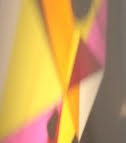four poems by josef albers...
1.
the more
the sun shines
the more
water evaporates
clouds appear
and the sun
- shines less
the more
the sun shines
the more
water evaporates
clouds appear
and the sun
- shines less
the less
the sun shines
the less
water evaporates
clouds diminish
and the sun
-shines more
da capo
2.
calm down
what happens
happens mostly
without you
3.
one is walking
one is standing
who is more entitled
to the path
4.
easy - to know
that diamonds - are precious
good - to learn
that rubies - have depth
but more - to see
that pebbles - are miraculous
Labels: abstraction, josef albers, poem, poetry

5 Comments:
Hi Roden, that's the second time I post a comment here. I definitely enjoy your blog, we have similar tastes and interests. I tried to post a message on the topic "The Third Bank of the River", but, for some reason, I couldn't. However, I just would like to correct an information and add something "new" to the jam. Rosa's name is João, not José. :)
Other than that, we can say that Guimarães Rosa is for the portuguese language what James Joyce is for the english language. He has forged a whole new lexical universe, and even today it is "hard" for portuguese speaking readers to read his works. I don't know if the english version respects that aspect of Rosa's work, and I thought it would be interesting to share this with you.
I can tell, on the other hand, that it is really pleasant to read something about the greatest brazillian writer of the 20th century written by someone like you. What I admire in your text is that it discusses Rosa's powerful imagination, not his language innovations, which is rare among brazillian scholars.
By the way, those four poems are simply beautiful, and that's enough. Poetry shouldn't be more than that. Bye!
hi nelson, thanks so much for thecommets. i can't believe i wrote his first name wrong... (well i can believe it, on my first cd i quoted jean dubuffet and spelled his name wrong on the liner notes... this one comes from a long line of misspelling the names of people who inspire me... kind of a standard roden mistake!). i can imagine these texts being so much more in portuguese, and so i'm left with his ideas because i can't really navigate the language. based on what i've read about rosa's work (very little), it does seem like the language of his writing is missing in the translations... so much of the work i enjoy reading unfortunately is in translation. it's interesting to hear that his use of language is even tough for portuguese because the stories seem so rooted in a kind of story telling that doesn't seem overly complex... they're deceptively simple until you start to think about what they are really saying - like hesse or kafka, you kind of follow along blindly to the storytelling and then you suddenly realize you are in another world. now i really wish i could read the originals! i discovered his work only recently, because i was invited to present my own work at the mercosur biennial in brazil later this year and the theme of the show is "the third bank of the river", so i instantly went on a search to find the story this came from. i love literature like this, where an entire journey is really based on one idea - a river with three banks, a minister of finance sitting in a tree, etc. they are so much like images in this way. anyways i'm glad you enjoy the blog. i love sharing the things i love and it's great to start the day digging out a book or record or image and visiting with it for a few minutes...
Yes, these are beautiful! I especially like 1 and 4...
“We want the student who sees that art is neither a beauty shop nor imitation of nature. And more
than embellishment and entertainment, but as a spiritual documentation of life, as a leader of quality, who sees that real art is essential life and essential life is art.” - Josef Albers on his work at Black Mountain College
I remember reading that Albers didn't consider the BMC work to be radical and hardly even experimental, but rather thought of their efforts as experiential.
wow... this is so central to my own thinking -
I remember reading that Albers didn't consider the BMC work to be radical and hardly even experimental, but rather thought of their efforts as experiential.
i really appreciate you noting this. if you every find the text you got it from please let me know. i talk to students about this all the time, and i think it's so important in terms of the experience tranlated or transformed through the personal rather than some feeble attempt at being new or "experimental". i sometimes walk into a studio and say "ugh... it smells too much like art in here"... albers would've been much more eloquent :-)
Well, I'm not absolutely certain, but I'm fairly sure it came from The Arts at Black Mountain College by Mary Emma Harris, which is the book I cited most in that paper I wrote years ago and which keeps these Albers quotes in my mind. Otherwise, I read it in a card at a BMC exhibit, which means the quote was more likely from some person's personal papers...
Post a Comment
<< Home